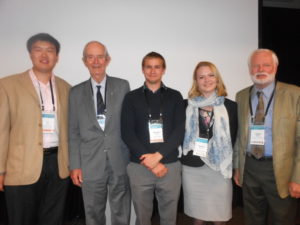
2014 Young Scholars: Yi Zhou

University of Adelaide
Sponsored by the SA Committee
After Yi completed his Master and PhD degree in 2013, he pursued a career in international agriculture research at The University of Adelaide. He has researched a wide range of topics including development of conservation cropping systems in Iraq, Syria and Jordan; soil biology analysis of Middle-eastern and Australian samples via genomic sequencing, and modelling technical efficiency of Indian farmers. He has a passion for writing scientific publications with fifteen papers published in prominent journals e.g. Functional Plant Biology, Environmental and Experimental Botany, Crop and Pasture Science and Crop Science. Attending Crawford fund 2014 conference will benefit Yi’s work in international agriculture research by providing an opportunity to communicate with leading scientists and young scholars.
Conference report
The benefits I received from the speakers in this conference include developing novel ways to link my current research with food security, improving my understanding of the potential for policy to impact food security, and realising Australia’s agriculture role and opportunities in meeting future world food demand.”
As a research scientist focussed on crop physiological mechanisms for improving yield, attendance at the Crawford Fund’s 2014 Parliamentary Conference brought me an excellent opportunity to better understand worldwide food security. The topic for this year’s conference “Ethics, Efficiency and Food Security: Feeding The 9 Billion, Well” is highly relevant in connecting my research. The benefits I received from the speakers in this conference include developing novel ways to link my current research with food security, improving my understanding of the potential for policy to impact food security, and realising Australia’s agriculture role and opportunities in meeting future world food demand.
As discussed by Professor Catherine Bertin, food security does not only mean more food but also the necessary nutrients, especially micronutrients for human health from the food. However, the relationship between food production and food nutrients for human health has only rarely been studied. I am currently working on a group of wheat varieties released from 1950s to 2010s. Our previous results showed yield and protein increased linearly with year of cultivar release. This conference highlighted that the relationship between micronutrients and release date of these varieties could be an interesting research topic to investigate whether breeding for higher production in the last 60 years impacted on food micronutrients.
“Policy making is indeed an art” (the Hon John Kerin AM). This conference showed me some interesting directions of policy that could be made for future food and energy security. Rachel Kyte identified that the world population would go up to 30% in 2050 while over 60% increase of grain production was required to meet this enlarged population due to more demand for meat. A potential solution for future food security through government policy could focus on women’s role in agriculture, because more women were involved in agricultural activities compared with men, especially in developing countries where 20-40% of the yield increase was related to activities of women. This interesting point was highlighted frequently in this conference by Professor Catherine Bertini, Dr Laurent Zessler, the Hon John Kerin AM and the Hon Julie Bishop MP. Additionally, another viewpoint attracted me was the importance of sweet sorghum reported by Dr Willie Dar. The grain of sweet sorghum can be used for food while the stalk use used for juice extraction for bioethanol, hence, sweet sorghum could be able to overcome the food-fuel trade-off.
After attending this conference, I have a clearer understanding of Australia’s role and opportunities in future world agriculture. In this conference Dr Jammie Penm analysed the Asian countries’ food demand in 2050 using economic models. The simulated results showed that by 2050, China would have huge demand for dairy products, beef and lamb, while India was projected to become a significant net importer of fruit, vegetables and dairy products. Understanding these changes can assist in the development strategy for Australia’s food export in future markets.
During this conference, I also developed networks with other young students to understand their ideas on international agriculture research which can help me supervise my master and PhD students more efficiently. The closer communications with Crawford Fund SA committee and other members from Crawford Fund board assist my understanding of the contributions Crawford Fund has made to increase the Australian impact in international agricultural development.
